The Window Box King of the Heights!
Plus! What About the Bialy?! Items of Interest!!!
Hello everyone,
Welcome to Issue #81 of CAFÉ ANNE!
Just a short letter this week because we’ve got a long feature. But I do want to take the opportunity to extend super hot-summer-in-the-city shoutouts to the newest paid subscribers: Pakelody C., Liz M., Jen D.S., Dustin G., Cathy H., the mysterious Sylvscow, Philip K., Lynn H. and the even more mysterious (and founding level supporter) L.R. I am going to take all this money and invest it in donuts. I am going to eat hundreds of donuts and think of you! Thank you.
I am very excited about this week’s issue, of course. We’ve the skinny on the bialy as a diet food from CAFÉ ANNE friend Sam Silverstein. And then a story I’ve been wanting to do for years, about the former doctor from Ukraine who’s behind all the fancy window boxes in my neighborhood. Please enjoy.
Regards!
Anne
ASK CAFÉ ANNE
What About the Bialy?
As readers will recall, Issue #79 featured a Q&A with NYC Bagel Tours and New York Bagelfest founder Sam Silverman on his NYC Bagel Diet, which lets him eat 10-12 bagels a week without turning into a bagel-shaped person. Among his recommendations: “scooping” is okay, but avoid the “flagel,” a flattened bagel that has just as many calories and carbs as the original.
Soon after, several readers wrote with the same question: “What about the bialy?”
Holy moly! I meant to ask Mr. Silverman about bialys but got so excited I clean forgot.
I immediately sent him an email: “What about bialys?” I wrote. “They seem to offer a bagel-adjacent but lower-carb and calorie experience without the ignominy of asking the counterperson to scoop.”
Mr. Silverman’s reply was extremely thorough, and thoroughly delightful:
Bialys! Let's discuss.
First off, what is a bialy, and how is it different from a bagel? The bialy is a Jewish baked good with an indent in the middle instead of a hole. This indent is traditionally filled with onions or poppy seeds. Unlike bagels, bialys are not boiled before they're baked, and also do not contain barley malt syrup, a key bagel ingredient. I like to think of them as the "Jewish English muffins" —lighter, and possibly friendlier to your waistline, albeit with a sacrifice to taste and texture (in my humble opinion).
Now, the more interesting question: why aren't bialys as popular as bagels? The answer tracks back to a bagel visionary named Murray Lender of Lender's Bagels fame. When the bagel-rolling machine was invented in the 1950's, Lender recognized the opportunity to bake bagels en masse, freeze them, and make them a household staple across the country.
But turning a niche Jewish food into a breakfast favorite required a marketing feat of Herculean proportions. So Lender embarked on a marathon campaign, investing decades and millions to convince America that bagels were not just an ethnic novelty but an essential part of an all-American breakfast (as an aside—Lender created sweet bagel flavors like blueberry to help woo the public).
So, why is it so hard to get a good bialy nowadays when bagels are so ubiquitous? It's because the bialy never got the same commercialization effort the bagel did. Thus, it's still considered to be a niche, Jewish food—a destiny that could have been the bagel's own, if not for Murray Lender.
Personally speaking, I didn't grow up with bialys so don't hold a strong affinity for them. But I understand the appeal and those who swear by them, like Peter Shelsky, whose mantra is "Anything that's good on a bagel is better on a bialy!"
Thanks Mr. Silverman!
ITEMS OF INTEREST
A Zine About NYC Cops Looking at Their Phones
Icelandic horses can write your out-of-office email for you
NYC Subway Station Location Game (I scored a near-perfect 21,378!)
FEATURE
The Window Box King of the Heights!
If you walk around my neighborhood, Brooklyn Heights, you'll definitely notice the window boxes. Residents really take them all the way. They are often spectacular—jammed with enough flowers and greenery to feed a giraffe. I sometimes plan dog walking routes to include my favorite boxes.
Asking around, I learned that many are the handiwork of one person—a local gardener and window box specialist, Serhiy Mshanetskiy. I was even more intrigued to learn that Mr. Mshanetskiy is originally from Ukraine, where he was a medical doctor. What?
New York is full of people like this this: Tibetan monks driving taxis, professors from Africa delivering groceries.
Last week, after years of imagining what he might be like, I met up with Mr. Mshanetskiy at a local café. Because I am a ridiculous person, I was expecting him to come in looking like Tolstoy circa 1890—with a long, white beard and wrathful expression. But he was a clean-shaven, blue-eyed man in his mid-50s dressed in khaki shorts—like every other fellow in Brooklyn Heights! I think I managed to hide my disappointment.
He's lived in the neighborhood since 1999, he told me over a cappuccino, but grew up in Ternopil, a city of 250,000 in Western Ukraine, "With a big lake in the middle."
"There is no war there," he said, anticipating my next question. "Except two rockets came. And a few months ago, two more rockets came.”
His parents were both physicians. "My mother was a doctor, my father was a doctor, that's all I knew." he said. "My mother's here now, actually. I brought her here one month into the war. Even though it's the western part of the country, just a few rockets. One is all you need!"
After medical school, Mr. Mshanetskiy worked in a Soviet hospital for eight years. He loved his profession.
"But when the Soviet Union collapsed, which was a good thing, we went through hyperinflation," he said. "I was getting paid the equivalent of $5 U.S. a month."
Not that there was much to buy in the stores. "There was no food on the shelves," he said. "You get your food somehow under the table, or you grow your own. I helped my grandparents. That was my biggest connection to gardening."
I asked what his family grew.
"That would have been potatoes, that would have been radish, that would have been squashes, carrots," he said. "The big crop was potato."
He waited, but the economy showed no signs of recovering.
"All this time you work, for what?" he said. "You're wasting your life!”
His solution? He moved to New Jersey. This was in 1998. He spent the first year living with fellow Ukrainians in Parsippany.
He worked in construction, as a bus boy in a French restaurant on the Upper East Side and as a parking lot attendant on the West Side.
"Those are not fun jobs, but I'm glad I took them because now I appreciate how it is," he said. "Parking attendant is a difficult job—you have to pull out eight cars to get to the one. Some cars you have to climb in through the window because they're packed so close to each other."
"So funny!" I said.
"Not when you're climbing through the window," he said.
"I've always wondered about this," I said. "In Ukraine you're a doctor. You come here, you're a busboy. What's that like?"
"It's an adjustment you have to do," he said. "You don't land at JFK and say, 'Where is my black limo, I'm going to my medical office in Midtown,' right? I was happy to be here and happy to get a job. Not a problem."
"Did you tell people, 'Hey! I was a doctor'"? I asked.
"No, quite the opposite," he said. "What would that add to my job, more tips? You give the doctor an extra dollar?"
Mr. Mshanetskiy offered a tour of his horticultural creations, but first we peeked into the first floor window of the Hicks Street apartment building where he recently installed his mother, Stanislava Mshanetska, who is 81. I saw the sewing machine she uses to make children's clothing to sell at the local consignment shop.
"What a change for her!" I said.
"A change for me too!" he said. "Nobody knew what was going to happen in this war. She came here with a small bag. She said, 'I come for one month and I go back.' She's been here one year and a few months."
Next we bumped into his girlfriend, piano teacher Ruslana Ilkiv, who was on her way to the beach. I took their photo.
She's from the same city as Mr. Mshanetskiy, but they met at an Easter service at a Ukrainian Church in Manhattan. "I go there once every ten years, right?" he said.
"You picked the right day!" I told him.
We viewed several of his patio gardens and boxes fronting townhouses on Hicks Street. Mr. Mshanetskiy said many clients want plantings for spring, summer and winter. Some spend thousands a year on their window boxes.
I also learned that his business is a lot bigger than I imagined. He employs a crew of eight workers—nearly all immigrants from Ukraine—who tend about 200 sites around the neighborhood.
But it's an oddly makeshift operation. He stows tools and supplies in a hidden shed on Clarke Street. His crews transport their gear around the neighborhood on little hand-pulled wagons. He has a small office in a building around the corner, which is around the corner from his apartment, which is around the corner from his mom's place. He never advertises and has no web site or Instagram or Facebook page. He uses AOL for email and tracks business affairs on a wadded sheet of paper stowed in his pants pocket.
We stopped to admire a box on Pierrepont Street crammed with yellow and blue pansies. "In the spring, I planted every flower box with yellow and blue. Because Ukraine," he said.
We turned the corner and walked up Columbia Heights—the neighborhood’s fanciest address. With their bonkers views of New York Harbor and the Manhattan skyline, the townhouses here sell for $10 to $20 million.
Mr. Mshanetskiy wound up living on this block in 1999 when he took a job with advertising executive Neil Calet, who needed a live-in caretaker and companion for his partner. He still tends Mr. Calet's grounds and showed me the backyard, his very first garden job.
"There was some free time," he said of his days living with Mr. Calet. "I went to the garden and started cleaning it.”
Soon, neighbors were asking Mr. Mshanetskiy to tend their gardens as well. He taught himself project-by-project.
"Someone once asked where I learned," he said. "I said, 'I'm a fraud!'"
By the time Mr. Calet's partner died, Mr. Mshanetskiy had built a sizable business but continued renting a room from his former employer for years afterward. He only left and rented his own apartment when he saw Mr. Calet needed the room for his own caregiver.
"It wasn't easy," he said. "For him, for me, separating. I know it was the right thing, but still! Next year he will be 90."
He still visits Mr. Calet every day.
"How would you describe your relationship?" I asked.
"A good friend," said Mr. Mshanetskiy. "In fact, Neil sponsored me for green card. How about that? Now I'm a citizen. And he was the one who convinced me gardening could be a profession. He said, 'You can do it for life. You work hard, you're good with clients and don't cheat them.’ It worked out the way he envisioned!"
At one point, in fact, Mr. Mshanetskiy got so excited about his new profession and nationality that he legally changed his surname to “Gardener.” He’s since resumed going by his original name.
We stopped by Mr. Calet's sitting room to say hello and take a photo.
"I've been admiring your window boxes for years," I told Mr. Calet.
"Thank him!" Mr. Calet replied, referring to his gardener.
"Neil is my mentor," said Mr. Mshanetskiy.
"Mentor!" said Mr. Calet. "Not Mental!"
We toured some more backyards and rooftop gardens on the block. You would not believe these houses—museum glossy and Architectural Digest all the way. One six-story townhouse had its own elevator. I knew that such people live in Manhattan, but always thought of my Brooklyn neighbors as more down-to-earth.
"It's amazing how people live," I said.
"Comfortable. The word is comfortable," said Mr. Mshanetskiy.
Between stops, we ran into a couple of his clients observing some rocks Mr. Mshanetskiy had installed in a sidewalk tree pit outside their townhouse. A discussion ensued. Were the rocks perhaps a little too round, and maybe too white? Mr. Mshanetskiy suggested he could source some darker, more jagged rocks.
Afterward, I asked him his favorite part of the job. "Gardening, the one thing I do the least now," said Mr. Mshanetskiy, who works 80-hour weeks. "I organize, I talk to clients, but don't do much gardening. You grow up-up-up, and that's how it is. But happy clients are a favorite too. I like! Who wouldn't?"
But even that can be taxing. "There's always some emergency," he said. "Weddings! Birthdays! What could be a gardening emergency? But there it is."
Walking back down the block to admire a row of eight homes bearing his window boxes, I asked Mr. Mshanetskiy how much attention he pays to the war in Ukraine.
"I did a lot last year," he said. "And then you just can't. Meaning, emotional toll, and time-wise. Hours a day. So I try to limit myself to 15 minutes a day. Just check what's going on in the morning, what's going on in the evening. Otherwise it's a waste of time. It doesn't help."
"My workers and I send money for clothes, for wood—to stay warm in the winter," he continued. "I sent some medical supplies. And then people who got my medical supplies, they sent a video of soldiers being saved because of the bandages."
He teared up.
"I don't remember how much bandage costs," he said. "I think $20, $50. Let's say $50. And it saved people's life. $50. That's how much people's life costs in Ukraine. If you have this bandage, you're alive. If you don't have this, you're not. This is not how much people's life should cost. So it's hard. You cannot think about this every day."
He brightened when his phone rang. It was his mother. He suggested a final stop, back at her place, to take a photo.
"Can you imagine including my girlfriend but not my mother's picture?" he said.
I asked if his mom enjoys shopping in the area. "She does!" he said. "She's learning English, so she goes to Key Food, the Fresh Start, Trader Joe’s. She will read label and if she doesn't know something, she puts down bottle, goes back home, takes out dictionary: 'Ah, okay, this is what it is!' And goes back to the store."
“She should just take the dictionary to the supermarket,” I said.
"She doesn't want to stand there and read.”
Ms. Mshanetska was waiting outside when we arrived and said something to her son in Ukrainian. She’d have preferred more notice before being photographed, Mr. Mshanetskiy told me.
They posed for several shots, which I showed them on my phone.
"Great!" said Mr. Mshanetskiy.
Ms. Mshanetska frowned and murmured again in Ukrainian.
"Mother!" said Mr. Mshanetskiy. "You're 81!"
He's not sure what will happen next. Maybe his mother will move back to Ukraine, if the war ends. Or his sister and niece, who fled to Poland, will move here. But he knows one thing for sure: "I am planning to stay in gardening for another quarter of century—or so!”
CAFÉ ANNE is a free weekly newsletter created by Brooklyn journalist Anne Kadet. Subscribe to get the latest issue every Monday!








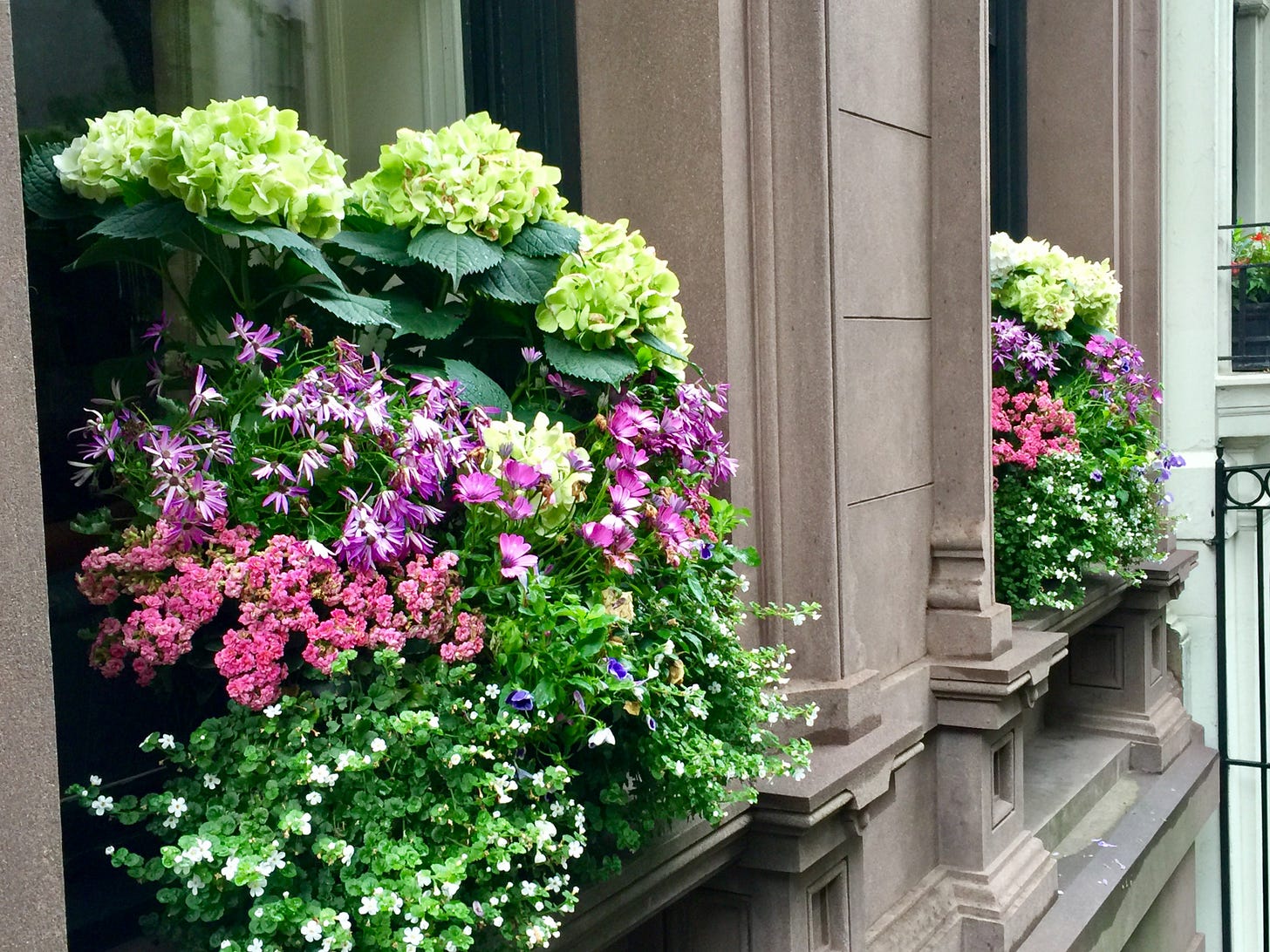
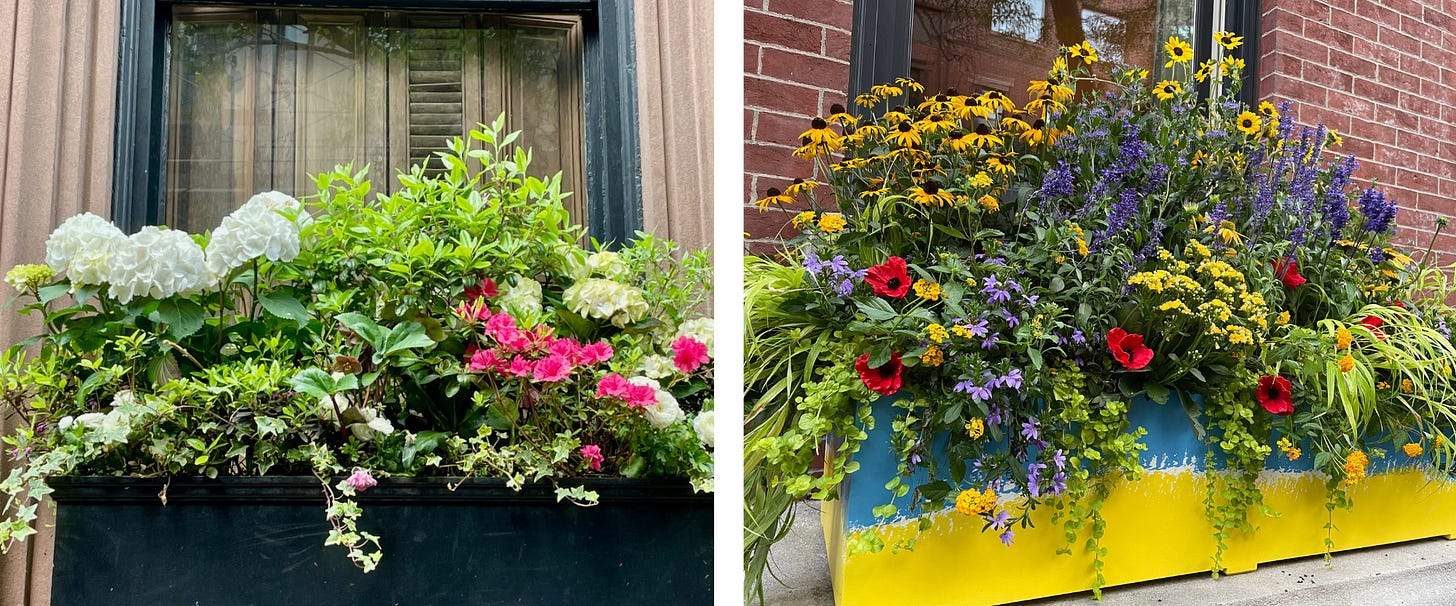

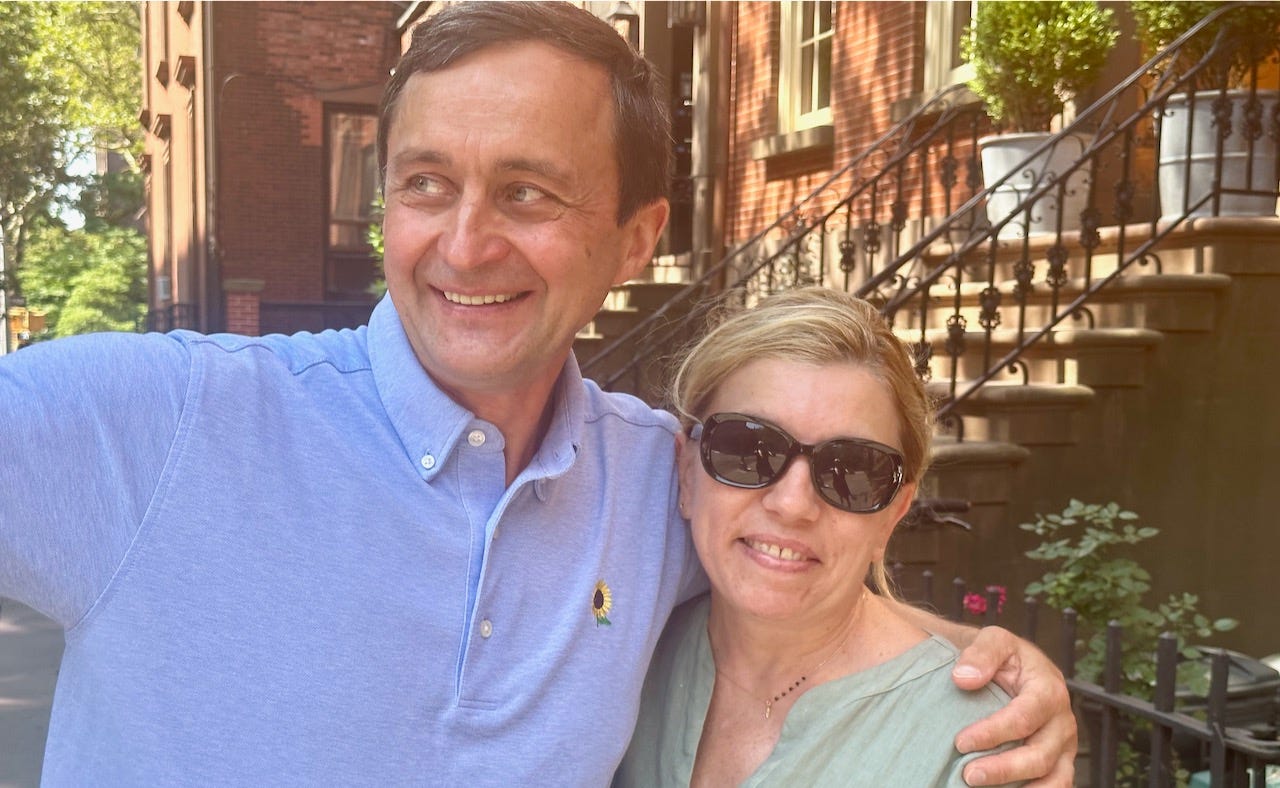
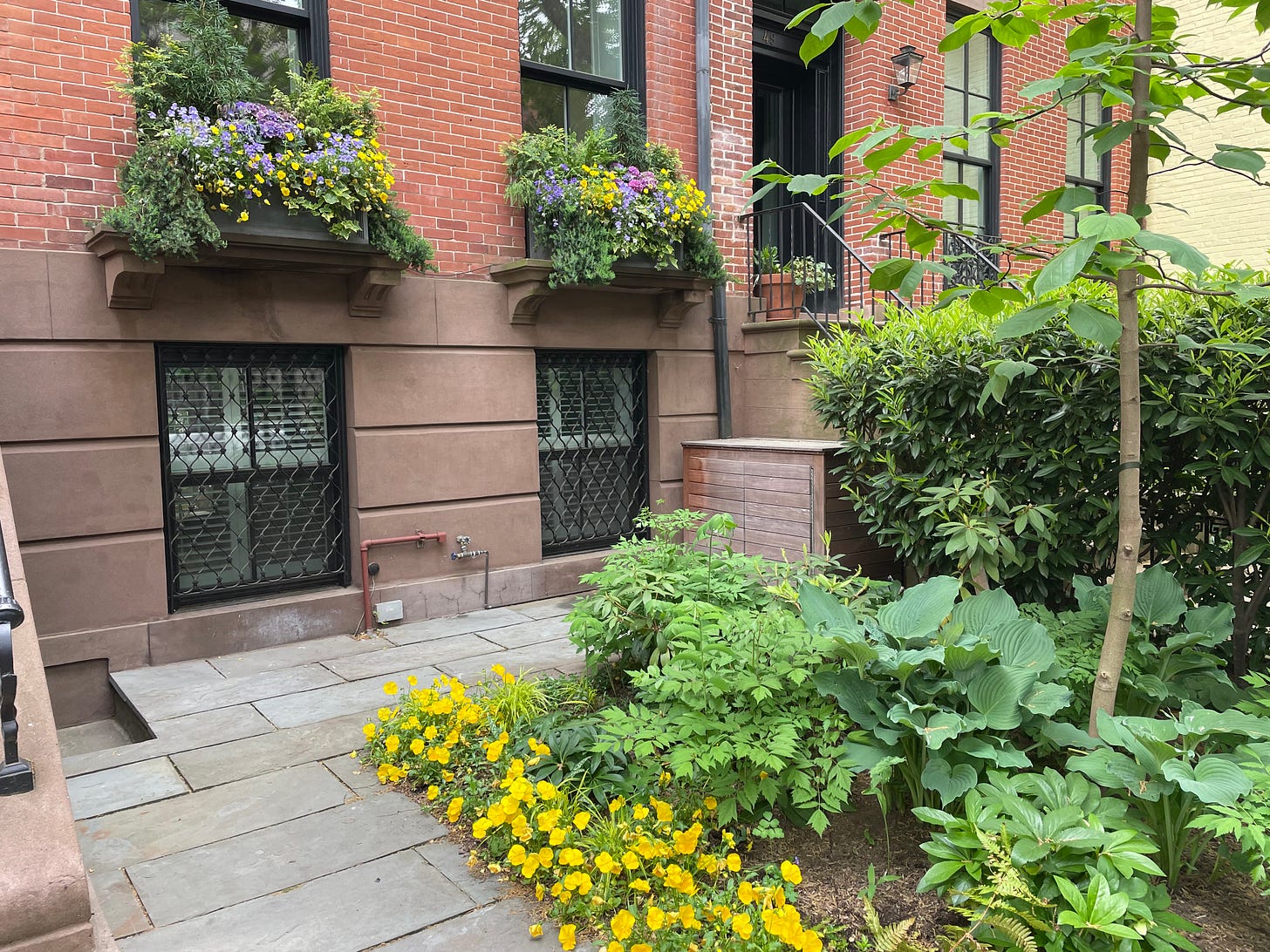

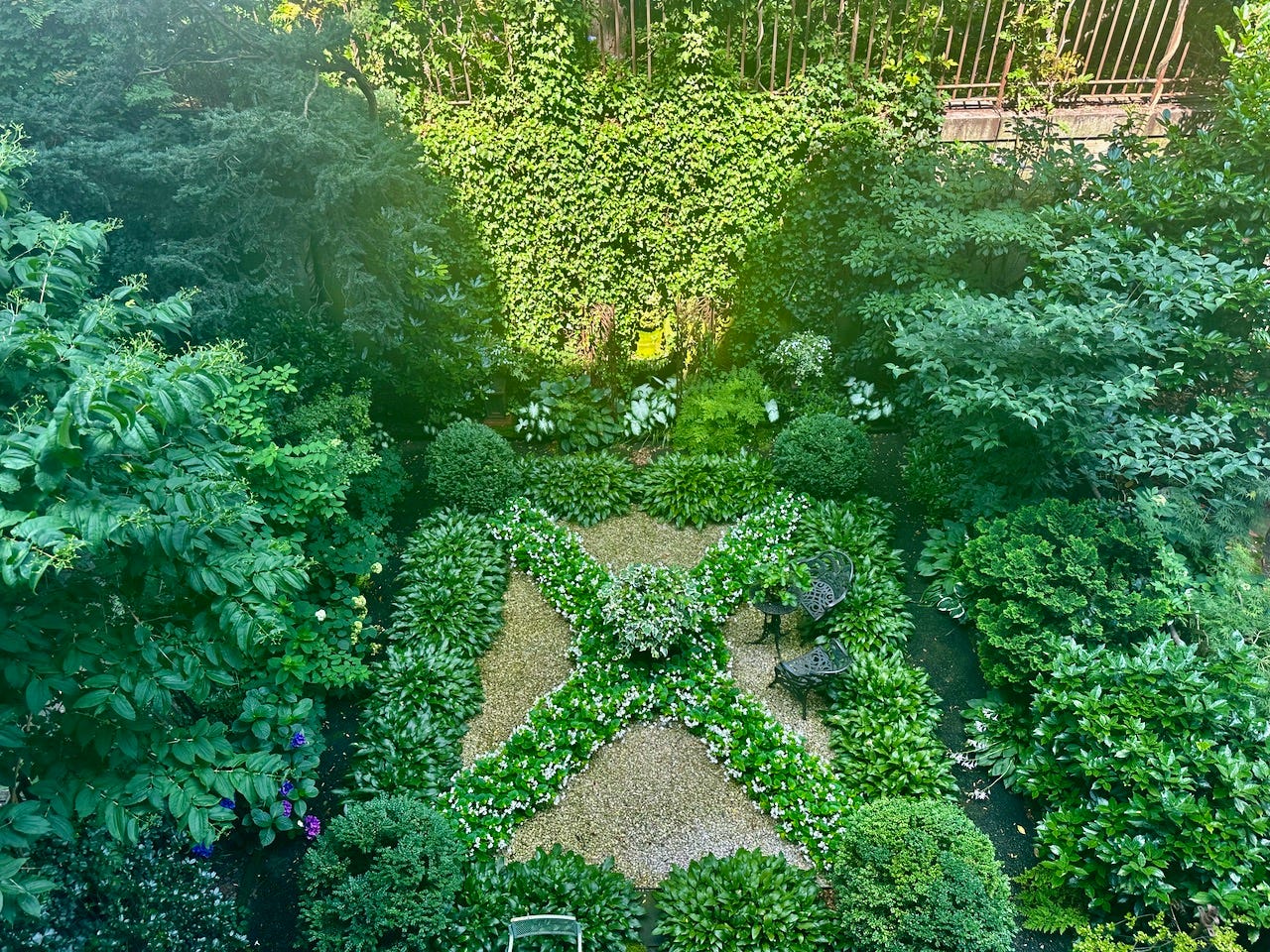
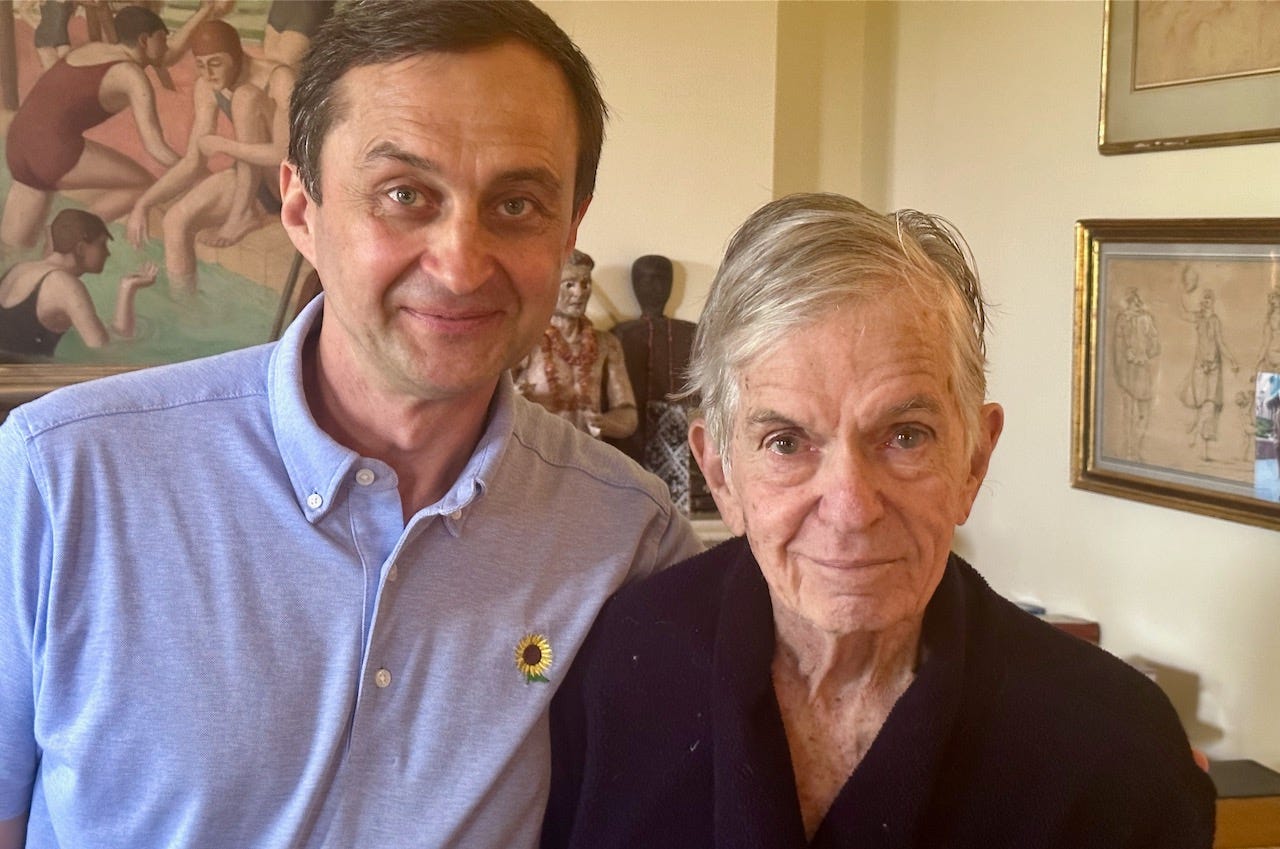



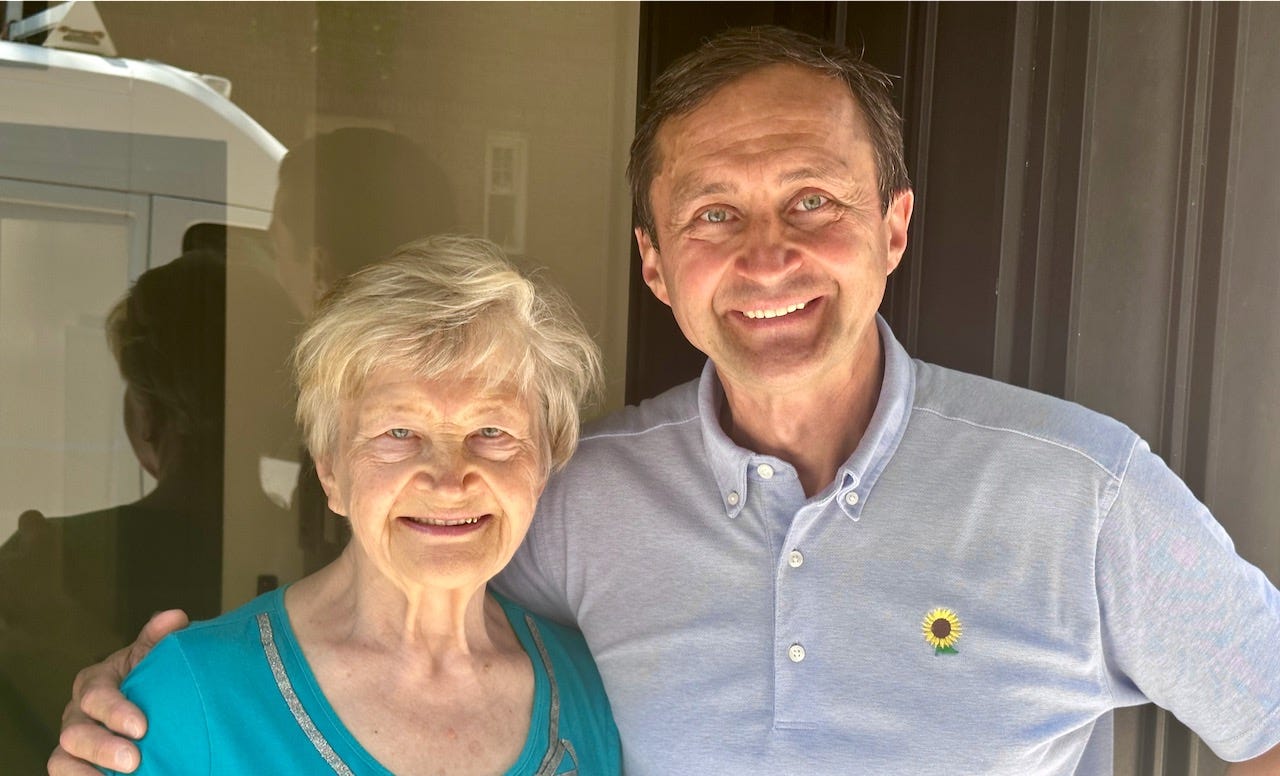

Lovely story about an immigrant gardener. I have known other immigrants who "downgraded" their professions when they came here. It does seem to come down to what Mr. Mshanetskiy says that you do what you must. But it makes me wistful and I wonder how much talent and training the human race loses to misery around the world....
Anne, I've been reading you since you started but I have to say I think this is the best one you ever published. Congrats!